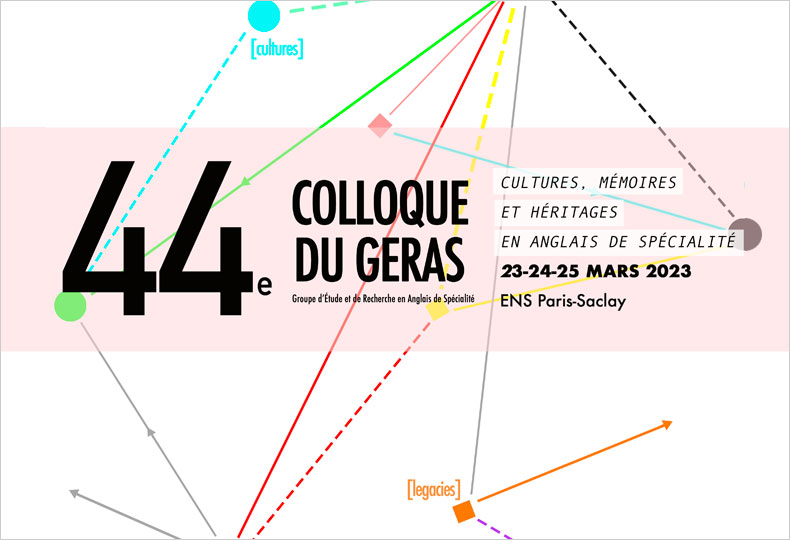Specialised English : Colloquium of GERAS 2023

Its 44th conference will take place at ENS Paris-Saclay from 23 to 25 March 2023. It invites participants to reflect on issues of memory, culture and heritage in the different approaches and fields of specialised English.
The conference is open to all.
Its 44th conference will take place at ENS Paris-Saclay from 23 to 25 March 2023. It invites participants to reflect on issues of memory, culture and heritage in the different approaches and fields of specialised English.
The conference is open to all. ENS Paris-Saclay ENS-PARIS-SACLAY webmaster@ens-paris-saclay.fr Europe/Paris public
PRACTICAL INFORMATION
GERAS 2023 CONFERENCE
Cultures, memories and legacies in specialised English
From 23 March 2023 (9am) to 25 March 2023 (12.30pm)
Location: ENS Paris-Saclay - 4 avenue des Sciences - 91190 Gif-sur-Yvette
Register online from 10 December 2022.
Specialised English
The specialisation of the English language can be thought of as a cultural, memorial and heritage phenomenon: to use specialised varieties of English is in effect to manifest one's adherence to certain specific cultural patterns, to display one's membership of professional or disciplinary discursive communities whose traditions oblige one to do so, to reproduce in the language legacies that frame and orient our choices.
Gradually mastering the codes and conventions of these specialised varieties of English, through formal or informal learning, means entering into a culture specific to specialised communities, embracing a memory, prolonging and keeping alive linguistic and behavioural legacies.
Through the notion of habitus, Pierre Bourdieu (1980: 91) has taught us that we are constantly subject to the influence of a "collective memory reproducing in the successors the achievements of the predecessors". Thus, the observable traces of cultures, memories and heritages in the English language reflect the fact that specialisation is above all a communal and collective phenomenon, which brings together certain human communities, constituted around particular social functions, around convergent language choices.
Themes addressed
- English-speaking specialist fields and milieus
- Discourse analysis, specialised genres, Professional Fiction (FASP)
- Didactics and the LANSAD sector
- Specialised corpora, corpus linguistics
- Translatology and specialised translation
- History and epistemology of research in specialised English
Plenary Conferences
Provisional title of the plenary: "When memory becomes culture: lessons from discourse analysis on specialised social communities"
Mr Stefano VICARI, University of Genoa, Italy
Provisional title of the plenary: "Cultural patterns in ESP teaching and learning"
Ms Shona WHYTE, University of Côté d'Azur, France
